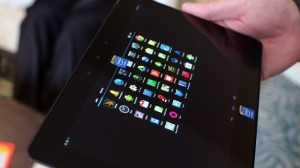In case it wasn’t clear already, Intel and Microsoft are no longer joined at the hip. Intel is trying desperately to grow its share of the tablet market, and with Windows flunking out on those devices, Android is the flavour of the month.
Intel hopes to see its processors used in 40 million tablets this year, and 80 to 90 percent of those will be running Google’s Android OS, CEO Brian Krzanich said on Tuesday.
Most Intel-powered tablets running Android today use the older Medfield and Clover Trail+ chips. More Android tablets running the latest Atom processor, called Bay Trail, will ship later this quarter.
That’s not to say Intel is abandoning Windows – far from it. It’s just going where the market is today. Krzanich said he expects Windows to “grow and gain traction,” and more Intel-based tablets running both Android and Windows will be shown in June at the massive Computex trade show in Taipei.
The first Android-based Bay Trail tablet, the DreamTab, was announced in January, but it hasn’t shipped yet.
Intel is chasing ARM, the U.K. company whose processor designs are used in most tablets today, including those running both Android and Apple’s iOS.
The 40 million Intel tablets that will ship this year will give the company 15 percent to 20 percent of the tablet market, Intel CFO Stacy Smith said on the earnings call.
Intel is providing discounts and development funds to tablet makers to reduce the cost of using its chips. It’s looking for growth with the white-box Chinese tablet makers, which are expected to ship up to 130 million tablets this year.
Intel chips are available in some tablets now priced under US$99, but most will be priced between $125 and $250, Krzanich said.
Microsoft hasn’t made much of a dent yet in Google’s and Apple’s share of the market, but IDC estimated last month that Windows would have 10.2 percent of the tablet market by 2017. Dell, Toshiba, Lenovo and Hewlett-Packard have launched Windows 8 tablets with Bay Trail, and Microsoft’s own Surface Pro 2 uses an Intel Core processor, but the tablets haven’t sold well.
Upcoming milestones for Intel will include the delivery of Cherry Trail later this year. It’s the successor to Bay Trail and will be built on a more advanced, 14-nanometer manufacturing process, which makes it more power efficient and allows for smaller transistors. Intel will also pitch its upcoming Merrifield chip at low-end tablets, though it’s mainly intended for smartphones.
Another important release slated for later this year is Sofia, a mobile chip that will initially have an integrated 3G modem. It will be offered in smartphones and tablets priced under $250, Krzanich said. Sofia chips with integrated 4G wireless will follow next year, he said.
Intel shipped 5 million tablet chips this year, but revenue from its Mobile and Communications Group fell 61 percent year over year. That’s partly because of the subsidies and the need to focus for now on the low-end Android market, but Intel hopes things will look up with its later, more capable chips.
“We don’t go into these businesses thinking we’re going to lose money. We believe we have a road map to get to profitability,” Krzanich said.






